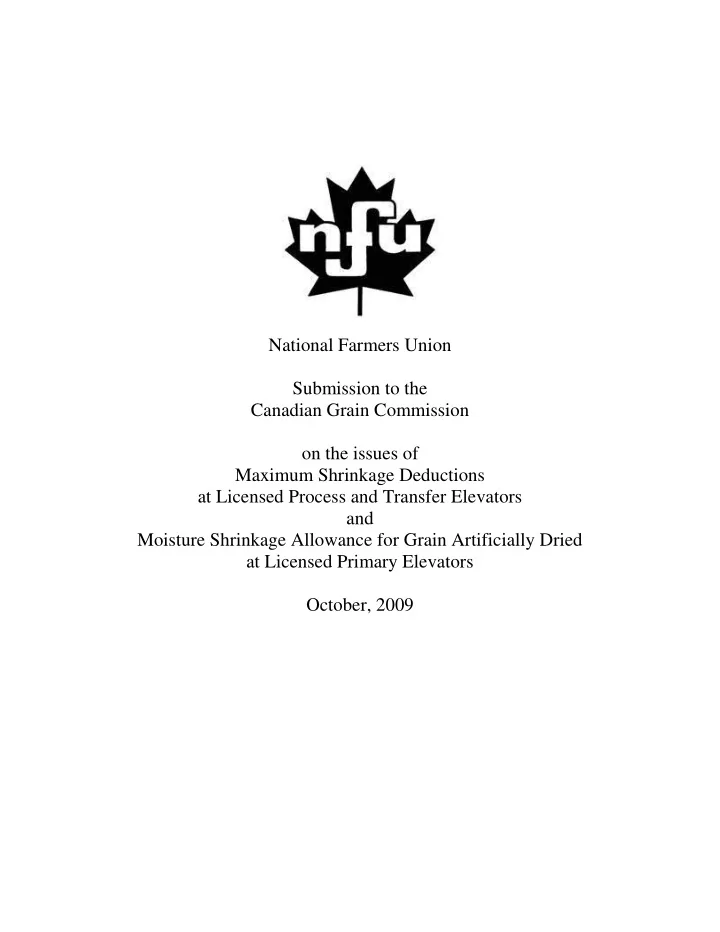

National Farmers Union Submission to the Canadian Grain Commission on the issues of Maximum Shrinkage Deductions at Licensed Process and Transfer Elevators and Moisture Shrinkage Allowance for Grain Artificially Dried at Licensed Primary Elevators October, 2009
National Farmers Union Submission to the Canadian Grain Commission On the issues of Maximum Shrinkage Deductions at Licensed Process and Transfer Elevators and Moisture Shrinkage Allowance for Grain Artificially Dried at Licensed Primary Elevators October, 2009 Introduction The National Farmers Union welcomes this opportunity to present its views on the issue of shrinkage deductions on grain. The NFU represents thousands of grain farmers in the prairie region who have a direct interest in the regulatory framework under which the Canadian Grain Commission operates. The NFU has put forward the views of its members on numerous occasions over the past decade on issues involving the Canadian Grain Commission. We believe it is of critical importance that the integrity of the mandate of the Canada Grain Act be maintained, and that the Canadian Grain Commission operate in the interests of grain producers. Maximum Shrinkage Deductions at Licensed Process and Transfer Elevators Shrinkage is defined in the Canada Grain Act as “the loss in weight of grain that occurs in the handling or treating of grain.” The Canadian Grain Commission sets maximum shrinkage allowances by regulation, and although the CGC has the authority to set maximum shrinkage levels at all types of elevators, it is not required to set maximums for all types of elevators. In particular, “grain dealers” are afforded ample opportunity for exemption from shrinkage allowances. A “grain dealer”, as defined in the Act, is “a person wh o, for reward, on his own behalf or on the behalf of another person, deals in or handles western grain.” While the regulations state that grain dealers trading on their own account or as agents must be licensed, there is a loophole that allows unlicensed grain dealers to play the system. Anyone trading in grain, while acting as an agent for a licensed grain dealer, can thus effectively, and legally, circumvent the licensing requirement. Shrinkage allowances for most facilities have been gradually reduced by the CGC through regulatory changes since the 1990s, thanks in large part to the advance of technology in the grain handling field. Shrinkage allowances at licensed terminal elevators were regulated to zero in 1990. In 2003, licensed primary elevators’ sh rinkage allowances were set at zero. However, there 2
are currently no maximum shrinkage allowances prescribed in the Canada Grain Regulations for grain delivered to licensed transfer elevators or process elevators. As the CGC background paper states, the absence of a uniform maximum shrinkage allowance for all facilities has provided an advantage to process elevators and transfer elevators. The fact that the CGC is undertaking this review is welcome news. The National Farmers Union recommends that the CGC set the maximum shrinkage deduction for licensed transfer elevators and process elevators at zero for all types of grain, including damp and tough grain. The fact that maximum shrinkage allowances at these facilities are currently not specified in the Canada Grain Regulations opens the door for manipulation by grain companies. In fact, shrinkage has historically been a convenient vehicle for grain companies to pad their profits. Likewise, shrinkage has historically been a source of frustration for farmers, as they ultimately paid the price for grain “lost” during the course of loading, handling and unloading. The official history of the Canadian Grain Commission 1 provides an indication of how extensive the problem was: “Overages in country elevators had bee n a problem from the beginning of the elevator business in the west. Some operators, fearful of having shortages at the end of the year, routinely took a small amount of grain from each farmer delivering into the elevator. This could be done in a number of ways. For example, when weighing in a wagonload, the operator might not wait for the scale to balance perfectly. The weight he assigned to the load would be less than the actual amount in the wagon. The difference would go toward a surplus or gross overage. A net overage, or a surplus on grain after the dockage was removed, could be produced by taking more dockage than was warranted. “The problem was brought before the Turgeon Royal Commission in 1923. The remedy offered by the Board of Grain Commissioners at that time was to allow the elevator agents to take a small percentage of the grain handled, as a compensation for shrinkage – that is grain lost in handling through spillage and the like. Before 1923, shrinkage had only been allowed on special bin grain; after it was allowed on all grains, in a percentage set by the Board. In 1931, overages again became an issue… All companies had operators who took not only the shrinkage allowance, but an extra amount of grain, for insurance. ” The current regulations allow licensed transfer elevators and process elevators to have shrinkage deductions as a negotiable item in the contract between the owner of the grain and the grain handling facility. However, the reality is that even though shrinkage deductions constitute part of the contract, they are rarely negotiable. It is the grain company that sets the deduction and farmers generally comply with whatever the company dictates. Grain dealers that are also licensed primary elevators must comply with the regulations regarding maximum shrinkage allowances. However, many grain dealers, because of the aforementioned loophole existing in the Canada Grain Act , are not required to abide by those regulations. The NFU recommends that all grain dealers, even those that are operating as agents of a licensed 1 J. Blanchard, A History of the Canadian Grain Commission 1912-1987, Minister of Supply and Services Canada – 1987, page 68. 3
Recommend
More recommend